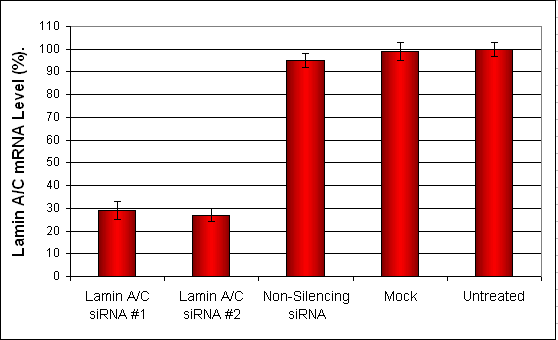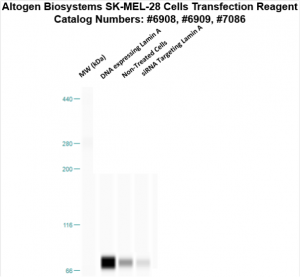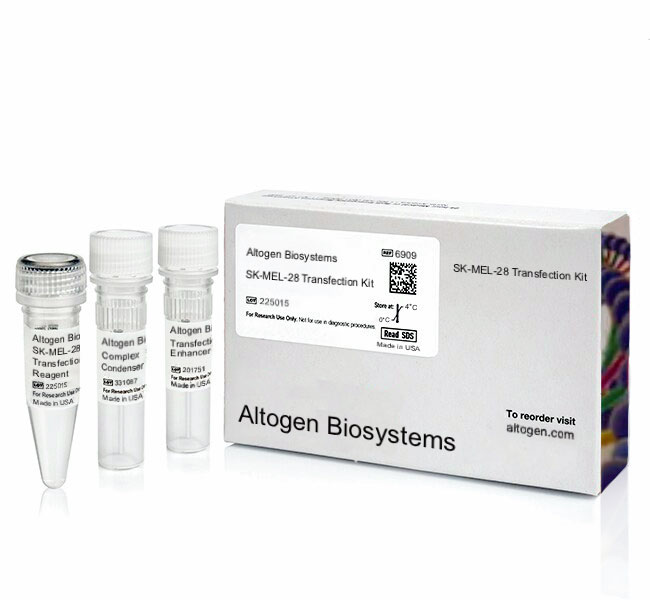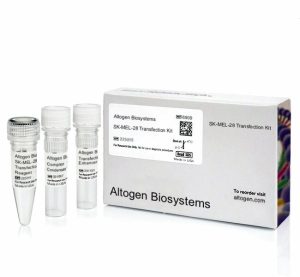Description
Purchase Orders: Click “Add to Cart” button to order, then email PO to orders@altogen.com.
Product Availability: In Stock.
Transfection Reagent for SK-MEL-28 Cells (Melanoma Cells, HTB-72)
- A nanoparticle-based liposome formulation
-
Transfection protocols provided for transfection of proteins, DNA, mRNA, siRNA, shRNA and microRNA
-
Transfection Enhancer reagent provided with the kit
-
Produce higher level of recombinant protein expression with minimal disruption of normal cell function
-
Generate physiologically relevant data you can trust
-
Easy-to-use transfection protocol with reproducible results
-
Download in vitro SK-MEL-28 transfection protocol: [PDF]
- Download SK-MEL-28 CRISPR/Cas9 transfection protocol: [PDF]
-
Download PowerPoint presentation for SK-MEL-28 cells transfection kit: [PPT]
-
Developed and manufactured by Altogen Biosystems
Transfection Efficiency:
Reagent exhibits at least 71% transfection efficiency of siRNA delivery. Transfection efficiency was determined by RT-PCR
Product Description:
Transfection kit for SKMEL28 cells, a human melanoma cell line. Transfection reagent supplemented by complex condenser and transfection enhancer.
Transfection Protocol and SDS:
Download Altogen Biosystems SK-MEL-28 Transfection Protocol: [PDF]
Download SDS: [PDF]
SK-MEL-28 Cell Line:
SK-MEL-28 is a human melanoma cell line that was derived from a skin lesion of a patient with malignant melanoma. The SK-MEL-28 cell line is commonly used in cancer research to study the mechanisms of melanoma development and progression, as well as to develop new treatments for this type of cancer. The SK-MEL-28 cell line is known to have mutations in the BRAF and NRAS genes, which are commonly found in melanoma. This makes the SK-MEL-28 cell line a useful model for studying the molecular mechanisms underlying melanoma and for testing potential anti-cancer drugs that target these genetic mutations. In addition to melanoma research, the SK-MEL-28 cell line has been used in studies on the molecular mechanisms of cancer metastasis and drug resistance. Malignant melanoma is an invasive form of skin cancer that originates from the transformation of melanocytes. It is characterized by the highly aggressive nature and ability to metastasize to diverse distant sites. Human cell lines can provide a realistic prediction of drug responses in humans as well as information on safety and efficacy of drug candidates. The SK-MEL-28 cell line was established from the skin of a 51-year-old male patient with malignant melanoma. SK-Mel-28 cells exhibit polygonal cell morphology, and this is just one of many melanoma cell lines (also named SK-MEL). The modal chromosome number of 90 occurs nearly in 50% of cells. Also, the hypotetraploid SK-MEL-28 expresses wildtype N-Ras gene. This tumorigenic cell line could be helpful for skin cancer research as well as for other cell and molecular biology applications. Altogen Biosystems manufactures nanoparticle-based transfection kits for the SK-MEL-28 cell line.
Mutations:
| BRAF | 673 | 37 | 7 | 140453136 | 140453136 | Missense_Mutation | SNP | A | T |
| PPP1R3A | 5506 | 37 | 7 | 113519565 | 113519565 | Missense_Mutation | SNP | C | T |
| TP53 | 7157 | 37 | 17 | 7578496 | 7578496 | Missense_Mutation | SNP | A | C |
| IL5RA | 3568 | 37 | 3 | 3139831 | 3139831 | Missense_Mutation | SNP | G | A |
| EIF3F | 8665 | 37 | 11 | 8008883 | 8008883 | Missense_Mutation | SNP | C | T |
| CDK4 | 1019 | 37 | 12 | 58145431 | 58145431 | Missense_Mutation | SNP | G | A |
| ZEB2 | 9839 | 37 | 2 | 145154100 | 145154100 | Silent | SNP | G | A |
| TTN | 7273 | 37 | 2 | 179604474 | 179604474 | Nonsense_Mutation | SNP | G | A |
| IQSEC1 | 9922 | 37 | 3 | 12977792 | 12977792 | Missense_Mutation | SNP | C | T |
| MGAM | 8972 | 37 | 7 | 141747669 | 141747669 | Silent | SNP | G | A |
| AOC1 | 26 | 37 | 7 | 150554581 | 150554581 | Silent | SNP | C | T |
Data:

Figure 1. siRNAs targeting Lamin A/C mRNA or non-silencing control siRNA were transfected into SKMEL28 cells following the recommended protocol. At 48 hours post-transfection the cells were analyzed by RT-PCR for Lamin A/C gene expression levels. 18S rRNA levels were used to normalize the Lamin A/C data. Values are normalized to untreated sample. Data are means ± SD (n=4).

Figure 2. Protein expression of Lamin A/C in SK-MEL-28 cells. DNA plasmid expressing Lamin A/C or siRNA targeting Lamin A/C were transfected into SK-MEL-28 cells following Altogen Biosystems transfection protocol. At 72 hours post-transfection the cells were analyzed by Western Blot for protein expression levels (normalized by total protein, 10 µg of total protein loaded per each well). Untreated cells used as a negative control.
Selected in vivo transfection product citations (ALTOGEN® IN VIVO Transfection Kits used in the following publications):
- 2008 454(7203):523-7. Innate immunity induced by composition-dependent RIG-I …Saito et al [PDF]
- Am J Pathology. 2010 177(4):1870-80. Role of ocular complement factor H in a murine model … Lyzogubov et al [PDF]
- Nature Biotechnology. 2011 29(4):341-5. Delivery of siRNA to the mouse brain by … Alvarez-Erviti et al [PDF]
- Cancer Research. 2011 71(15):5144-53. Inhibition of miR-193a expression by… Iliopoulos et al [PDF]
- 2010 16(11):2108-19. RNase L releases a small RNA from HCV RNA that refolds … Malathi et al [PDF]
- 2012 55(7):2069-79. The p47phox- and NADPH oxidase organiser 1 … Youn et al [PDF]
- British Journal of Cancer. 2012 107(3):516-26. TIGAR induces p53-mediated cell-cycle … Madan et al [PDF]
- 2014 63(2):353-61. Tissue transglutaminase contributes to … Liu et al [PDF]
- Circulation Research. 2010 15;107(8). Kruppel-like factor-4 transcriptionally regulates … Cowan et al [PDF]
- 2012 59(1):158-66. Role of uncoupled endothelial nitric oxide synthase … Gao et al [PDF]
- Jounal of Biological Chemistry. 2012 287(4):2907. Chaperoning of mutant p53 protein … Gogna et al [PDF]
- PLoS Pathogens. 2012 8(8) Uridine composition of the poly-U/UC tract of HCV RNA … Schnell et al [PDF]
- J Proteome Res. 2012(11) Retinal proteome analysis in a mouse model of oxygen-induced … Kim et al [PDF]
- 2011 141(2) Differential type I interferon-mediated autophagic trafficking … Desai et al [PDF]
- PLoS Pathog. 2014 10(10) Exosomes from hepatitis C infected patients transmit HCV … Bukong et al [PDF]
Altogen Biosystems is a life sciences company that offers cell type-specific and pre-optimized transfection products, elecroporation kits, and in vivo delivery reagents. Advanced formulation of reagents and optimized transfection protocols provide efficient intracellular delivery of protein, DNA, mRNA, shRNA and siRNA molecules. Read more about transfection technology at Altogen’s Transfection Resource. Altogen Labs provides safety and efficacy preclinical research services. GLP-compliant studies for IND applications, and drug development, including over 90 in-house validated xenograft models, safety toxicology, etc (visit AltogenLabs.com).
Volume Options:
- 0.5 ml (Catalog #6908)
- 1.5 ml (Catalog #6909)
- 1.5 ml CRISPR (Catalog #2193)
- 8.0 ml (Catalog #7086)
Purchase Orders: Click “Add to Cart” button to order, then email PO to orders@altogen.com.
Product Availability: In Stock.






